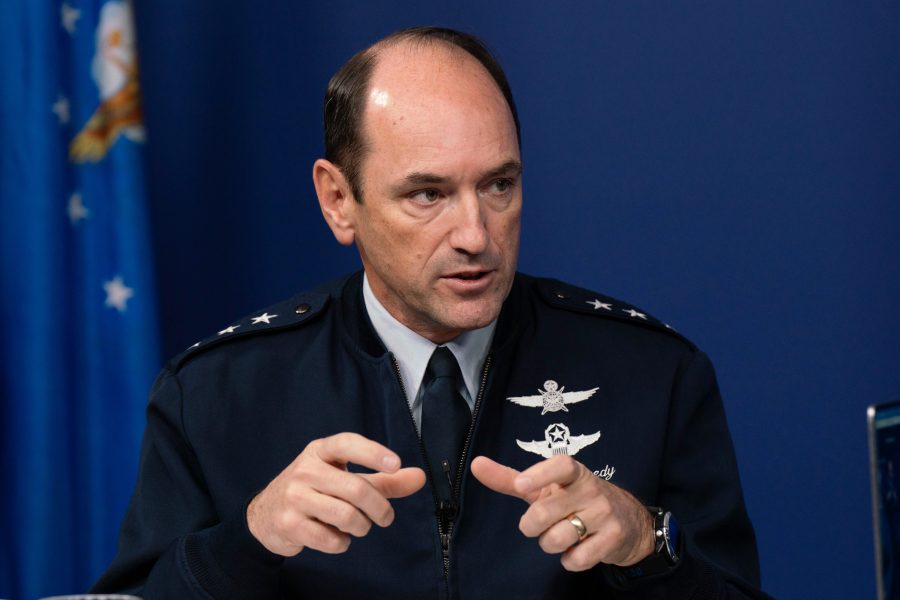The 16th Air Force is working on an “information warfare operations center concept” to more effectively counteract narratives pushed by China and Russia, said its commander, Lt. Gen. Kevin B. Kennedy Jr., Nov. 13. Enhanced “unity of effort” across the service is the goal, Kennedy said during a livestreamed discussion with AFA’s Mitchell Institute for Aerospace Studies.
“We have public affairs Airmen that are trained in how to get messages out and how to transmit what we’re seeing to the American population as well as global audiences,” Kennedy said. “We have cyber experts that understand how to gain access and understand what’s happening in that domain. Clearly we have our intelligence, surveillance, and reconnaissance experts.
“But the biggest thing that we’re doing right now is not a new tool, but it’s really understanding how do we take this expertise, converge all those capabilities, to establish that baseline? And the concept is a unity of effort. How do we generate unity of effort without specific unity of command? Yes, they’re all within 16th Air Force, but their operational activities a lot of times … are operationally controlled by somebody else.”
Within the 16th Air Force, the 616th Operations Center was formed in March 2020 by combining the 624th and 625th Operations Centers, responsible for coordinating cyber and ISR operations worldwide.
Now within the new operations center, Kennedy said, “we’re building a competition-based framework that allows us to pull across the other components. So whether it’s the [Combined Forces Air Component Commander] out in the Pacific or the CFACC in Europe … we think about, how do we enable ‘reveal, conceal, expose, or disruption’ type of activities.”
Information warfare is intensifying as U.S. competition with China intensifies. China is the “pacing challenge” according to the National Defense Strategy. Information warfare activities “can have real strategic advantage,” Kennedy said.
On one hand, the Pentagon has stepped up its efforts to expose dangerous or provocative behavior on the part of Chinese or Russian forces, declassifying hundreds of incidents and releasing photos and videos from dozens of them.
On the other, the 16th Air Force and its partners across U.S. Cyber Command, the FBI, and other government agencies are working to disrupt IW efforts like disinformation and misinformation being pumped onto social media.
On American-owned platforms, disrupting those efforts can merely mean reporting Chinese or Russian propaganda as violating Terms of Service. But Kennedy noted that the effort is more complicated on the hugely popular app TikTok, which has drawn scrutiny for its connections with the People’s Republic of China and possible data collection.
“The grabbing of data from TikTok isn’t my biggest concern,” Kennedy said. “It’s the manipulation of our perceptions and [efforts to use the platform to] try to shape our behavior…. If your first reaction when you see something is an emotional one, you’re being manipulated. Now that’s a form of rhetoric. That’s good. But then always look for those other forms of logic—don’t take what you’re seeing, and just realize, your social media feeds, especially on TikTok, are being curated by the PRC or those aligned to the PRC in ways that are pushing certain narratives and certain information and trying to foment dissent within our population as well as to push the narrative that’s advantageous to the PRC.”
Chief Master Sergeant of the Air Force JoAnne S. Bass highlighted those dangers in a September keynote address at AFA’s Air, Space & Cyber Conference. “There are armies of bots, swarms of trolls, legions of sock puppets, strategically manipulating the information that we see to achieve their own objectives,” said Bass. “This is unrestricted warfare and it comes with minimal to no physical force.”
Kennedy said that, in addition to defending against IW, the 16th Air Force also wants to create a clear “baseline” understanding for service leadership on how its own information warfare efforts are working.
“We have the enterprises resident in our Numbered Air Force, to enable us to understand what potential causation and correlation for some of the things that we’re doing there and establish that baseline,” Kennedy said. “So if we do something in the future, we’re able to go to senior leaders that are executing that and say this operation was observed and this was the insight that our adversary took from this operation, and then we can help think about our behaviors in that way.”

